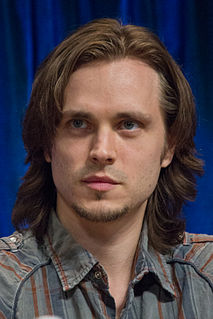A Quote by Edward Herbert, 1st Baron Herbert of Cherbury
Truth exists. The sole purpose of this proposition is to assert the existence of truth against imbeciles and sceptics.
Related Quotes
All great art is by its very essence in conflict with the society with which it exists. It expresses the truth about the existence regardless of whether this truth serves or hinders the survival purpose of a given society. All great art is revolutionary because it touches upon the reality of man and questions the reality of the various transitory forms of human society.
Everyone who observes himself doubting observes a truth, and about that which he observes he is certain; therefore he is certain about a truth. Everyone therefore who doubts whether truth exists has in himself a truth on which not to doubt.... Hence one who can doubt at all ought not to doubt the existence of truth.
A Christian boy or girl can learn mathematics, for example, from a teacher who is not a Christian; and truth is truth however learned. But while truth is truth however learned, the bearing of truth, the meaning of truth, the purpose of truth, even in the sphere of mathematics, seem entirely different to the Christian from that which they seem to the non-Christian; and that is why a truly Christian education is possible only when Christian conviction underlies not a part but all, of the curriculum of the school.
The Bible is a wonderful book. It is the truth about the Truth. It is not the Truth. A sermon taken from the Bible can be a wonderful thing to hear. It is the truth about the truth about the truth. But it is not the truth. There have been many books written about the things contained in the Bible. I have written some myself. They can be quite wonderful to read. They are the truth about the truth about truth about the Truth. But they are NOT the Truth. Only Jesus Christ is the Truth. Sometimes the Truth can be drowned in a multitude of words.
In the ordinary, everyday understandings of the words involved, to say that someone survived death is to contradict yourself; while to assert that all of us live forever is to assert a manifest falsehood, the flat contrary of a universally known truth: namely, the truth that all human beings are mortal. For when, after some disaster, the 'dead' and the 'survivors' have both been listed, what logical space remains for a third category?
I don't think the law exists to arrive at the truth. If it did, we wouldn't have exclusionary rules, we wouldn't have presumptions of innocence, we wouldn't have proof beyond reasonable doubt. There's an enormous difference between the role of truth in law and the role of truth in science. In law, truth is one among many goals.








































